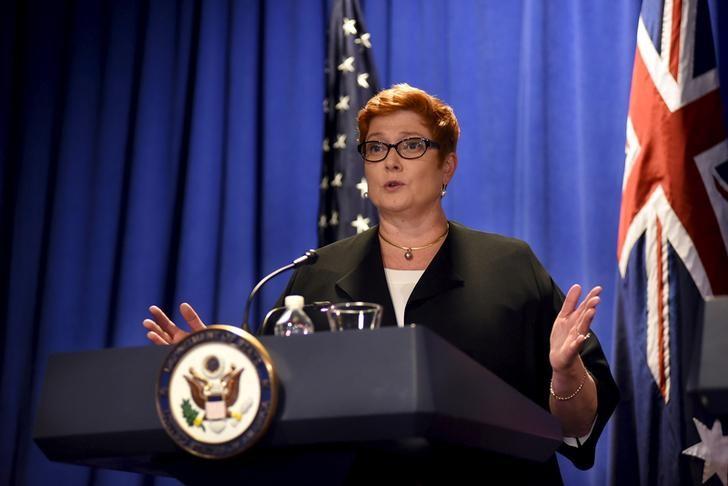CANBERRA, (THE AUSTRALIAN) – Australia is in talks with Papua New Guinea to finance its domestic internet cable network, in a bid to shut out Chinese company Huawei from building the infrastructure amid warnings its involvement would pose an unacceptable cybersecurity risk.
The Australian has learned a taskforce from the Department of Foreign Affairs and Trade is working on plans to finance the network from a new trilateral infrastructure fund with the US and Japan.
It is understood former prime minister Malcolm Turnbull discussed the proposed support with PNG Prime Minister Peter O’Neill at a July 11 bilateral meeting, before they attended the third State of Origin rugby league match in Brisbane
Former foreign minister Julie Bishop then raised the project with US and Japanese counterparts Mike Pompeo and Taro Kono on the sidelines of the East Asia Summit in Singapore early last month.
Bishop proposed the network as the first investment of the new Australia-US-Japan infrastructure fund, established this year to counter growing Chinese influence in the Indo-Pacific region through its Belt and Road Initiative.
The Australian understands that as a fallback, the federal government is looking at funding the PNG project through a concessional loan with a lower overall cost and better repayment arrangements than the Huawei proposal, which would be funded by China’s Eximbank.
The revelation follows The Australian’sreport Thursday that Turnbull and O’Neill had set in motion plans for a joint naval base on Manus Island, edging out Chinese interest in the key port with a facility capable of hosting Australian and US warships.
The move to fund PNG’s domestic cable network follows Australia’s $136 million (US$98 million) investment in a 4000km international cable to PNG and the Solomon Islands, which was also set to be built by Huawei until Australia intervened. The 5457km PNG domestic network will provide undersea cable connecting to 14 provincial centres.
It will connect to the Australia-PNG-Solomons cable, which will link to the Australian fibre-optic network in Sydney.
In August, PNG Public Enterprise and State Investments Minister William Duma announced that Huawei had been selected to complete the domestic cable project, funded by a $274m (US$199 million) Eximbank loan. Australian sources suggested the contract had not been finalised, and the cost of the Huawei proposal was estimated to be 30 to 50 per cent too high.
Lowy Institute Pacific program director Jonathan Pryke said the reported cost of the Huawei bid “should certainly raise eyebrows”, given the international link cost less that half that amount.
“Considering the PNG government’s current budgetary challenges, they can’t afford to be ripped off,” he said.
Huawei was banned from participating in the rollout of Australia’s 5G mobile network under rules precluding the involvement of any company that could be subject to “extrajudicial directions from a foreign government that conflict with Australian law”.
Australian Strategic Policy Institute cyber security expert Tom Uren said Huawei’s involvement in PNG’s domestic cable project could open the door to eavesdropping on communications within PNG, and between Australia and its key regional ally.
“If this PNG domestic cable is connected directly to the international cable to Australia, it could potentially provide covert access to communications between Australia and PNG,” Uren said.
“There is no hard proof that Huawei has done this, but Chinese laws essentially compel assistance if intelligence agencies require it. Coupled with China’s voracious appetite for cyber espionage, this definitely represents a risk.”
Foreign Minister Marise Payne said Australia was committed to working with PNG to achieve its development ambitions, and to support improvements in security and stability across the Pacific.
“We have a very close and longstanding relationship with PNG and we constantly discuss their priorities for economic growth and development,” Senator Payne said.
In last year’s foreign white paper, the government committed to “stepping up” its engagement in the Pacific, in the face of growing Chinese interest in the region.
PNG has long viewed Australia as its principal security partner but has faced a wave of generosity from Beijing, which has flooded Pacific countries with cheap finance for infrastructure projects.
O’Neill, who enjoys close relations with Chinese President Xi Jinping, agreed on a recent trip to Beijing to allow Mr Xi to host a summit for Pacific Island leaders ahead of the APEC leaders’ meeting. For Xi, the PNG trip will be an official “guest of government” visit, with red-carpet treatment.
Scott Morrison declined to comment on the prospect of Australia establishing a joint naval facility with PNG on Manus Island, but reiterated Australia’s close relationship with its Pacific neighbours.




